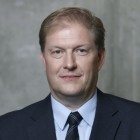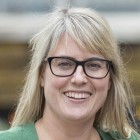Panel Presentation Session IMP33
Higher Education Strategy: Putting Learners First
Date Thursday, Dec 7 Time – Room: Potsdam 1
With academic, financial, strategic and operational choices to be made, how do our panelists from three different Higher Education Institutions keep putting the intellectual development of their students first? How do they map the future of their own continuous innovation and what are the advantages and disadvantages of their strategies?

Kay Lipson
Executive Director - Growth Initiatives, Online Education Services (OES), Australia
Kay is currently the Exectutive Director Growth Intiatives for Online Education Services (OES). Founded in 2010, OES is a public-private partnership between SEEK, who have matched over 150,000 students with their ideal course and Swinburne University of Technology, a pioneer in online education with over 20 years’ experience.
The partnership’s first endeavour, Swinburne Online, was launched in 2011 with 10 undergraduate courses in the fields of Business, Social Science and Communication. By 2017, Swinburne Online had expanded its offerings to include 21 undergraduate and postgraduate university courses, five TAFE courses and offerings for international students, with over 10,000 students currently enrolled.
Kay’s discipline area is Statistics, and she has previously undertaken academic roles at the University of Melbourne, Monash University, and Swinburne University of Technology. Her most recent academic role in leadership was as Dean of the Faculty of Higher Education, Lilydale, at Swinburne University of Technology, from 2009 to 2011.
Links

Ari Jónsson
Rector/President, Reykjavik University, Iceland
Dr. Ari Jonsson is the president of Reykjavik University; a private non-profit university in Iceland that focuses on education, research and industry collaboration in the areas of technology, business and law.
Dr. Jonsson completed his doctoral degree in Computer Science from Stanford University in 1997, with focus on artificial intelligence and autonomous decision- making. He then joined NASA as a research scientist, working on the development of automated technology to improve the efficiency and reliability of spacecraft operations. During his tenure at NASA, he managed a number of research and development projects, contributing to missions such as the Deep Space One experimental spacecraft, the Mars exploration rovers Spirit and Opportunity, and the operations of the International Space Station.
In 2007, Dr. Jonsson moved to Reykjavik University as the Dean of the School of Computer Science. In January 2010, he became the President of the university and has served in that role since then. Dr. Jonsson is active in policy development and has served for over seven years on the Icelandic Science and Technology Policy Council.
Dr. Jonsson actively supports the innovation and entrepreneurship environment in Iceland. He is the Chairman of the Board for one startup and a board member for a few other companies.
Links
Moderator

Maren Deepwell
Chief Executive, Association for Learning Technology, UK
I am the chief executive of the Association for Learning Technology(ALT) and I work as a Learning Technologist and Anthropologist. I am an Open Practitioner with a special interest in leadership, equality and open education.
My work for ALT focuses on increasing the impact of Learning Technology for the wider community, strengthening recognition and representation for the Membership at a national level and leading professionalisation for individual Learning Technology professionals in a broad range of roles.
As a trained sculptor I can carve marble, but nowadays I focus on bringing about change through policy, community engagement and open governance. Whilst much of my work is in the UK, I am bilingual in English/German and I use my other language skills to keep up with developments in education and technology across the globe and beyond the English speaking nations.
My studies in art and anthropology have given me an appreciation for the importance of criticality, history and theory and how they inform our understanding of education and technology. I am a fan of new technology, a geek at heart, but not one to embrace innovation unquestioningly.
